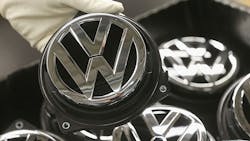Another week, another scare from the German car industry.
What began with Daimler AG’s massive recall of more than 3 million diesel cars to lower their emissions, ended on July 21 with Audi also embarking on a voluntary recall of 850,000 vehicles. Adding to the spate of bad news was a report in Der Spiegel magazine that the biggest car manufacturers -- Daimler, BMW AG and Volkswagen AG as well as VW’s Audi and Porsche brands -- may have colluded for decades on technology. The companies declined to comment.
Shares of BMW, VW and Daimler tumbled on the report, which cited a document submitted by Volkswagen in July 2016 and referenced another from Daimler. The German cartel office said in a statement that it searched the car companies last year as part of a probe into a possible steel cartel. It didn’t elaborate on a possible follow-up probe on car technology, saying it can’t comment on ongoing investigations.
For almost two years now, the German car industry has sought to get out from underneath the cloud of the diesel scandal that erupted first at VW and has cost it billions in fines and has since threatened to engulf other carmakers, tainting the image of German engineering and hurting the industry that’s among the country’s biggest employers. The scandal comes as automakers wrestle with an unprecedented technology shift in the industry, with electronic cars made by Tesla Inc. or Toyota Motor Corp. finding more buyers and German manufacturers trying to catch up with the battery-powered vehicle trend.
200 Employees
According to the Spiegel report, the five German car brands met starting in the 1990s to coordinate activities related to their vehicle technology, costs, suppliers and strategy as well as emissions controls in diesel engines. The discussions involved more than 200 employees in 60 working groups in areas including auto development, gasoline and diesel motors, brakes and transmissions. Talks may have also involved the size of tanks for AdBlue fluid for diesel autos, the magazine reported, which is at the heart of the emissions case.
“These allegations look very serious and would mean more than 20 years of potential collusion,” said Juergen Pieper, a Frankfurt-based analyst with Bankhaus Metzler. “There seems to be a never ending story of bad news about the industry’s bad behavior.”
Mercedes has struggled to shake off allegations that it also tampered with emissions standards, an accusation the company has routinely rebuffed and said last week it would legally contest. Still, Daimler announced a surprise recall on July 18, following a meeting with German government officials last week to discuss emissions technology. Audi followed on July 21 with its own recall to update the software in Euro 5 and Euro 6 engines.
Bridging Gap
European carmakers are shoring up diesel because they need it to bridge the gap between tightening rules for greenhouse-gas emissions and ramping up electric-car plans. Authorities are scrutinizing the technology after Volkswagen admitted in September 2015 to rigging cars to cheat on emissions tests. Cities such as Paris, Madrid and Mexico City are looking into banning the models because of air pollution concerns.
According to the cartel office, the raid took place exactly a year ago and targeted six carmakers and suppliers. Der Spiegel said that the follow-up probe was essentially a by-product of that raid, which involved 50 employees of the cartel authority, aided by local police and regional law-enforcement officers.
The Spiegel article said that one aim of the collusion was to obstruct competition, with the carmakers agreeing on costs for components or technical details such as convertible roofs.
“The allegations are quite detailed, so it’s unlikely there’s this much smoke without fire,” said Christian Ludwig, an analyst at Bankhaus Lampe in Germany, who estimates any fines could run into the billions. “In the current environment, that’s a another hit.”
By Elisabeth Behrmann
About the Author
Bloomberg
Licensed content from Bloomberg, copyright 2016.
